ASIC v Adler [2002] NSWSC 171: Case Analysis and Legal Implications
VerifiedAdded on 2023/06/11
|9
|2403
|225
Report
AI Summary
This report provides a comprehensive analysis of the ASIC v Adler [2002] NSWSC 171 case, which is a landmark case in Australian corporate law. The report begins with an introduction to the case, followed by a detailed examination of the facts, including the inappropriate behavior of Adler, a non-executive director of HIH. It then analyzes the breaches of directors' duties under the Corporations Act 2001 (Cth), specifically focusing on sections 180, 181, 182, and 183. The judgment of the court, including the penalties imposed on Adler and Ray Williams, is discussed. The report also highlights the lessons learned from the case, emphasizing the importance of directors' compliance with their duties and the consequences of non-compliance. Furthermore, the report includes observations regarding the case and concludes with a summary of the key findings. The report also includes a detailed list of references.
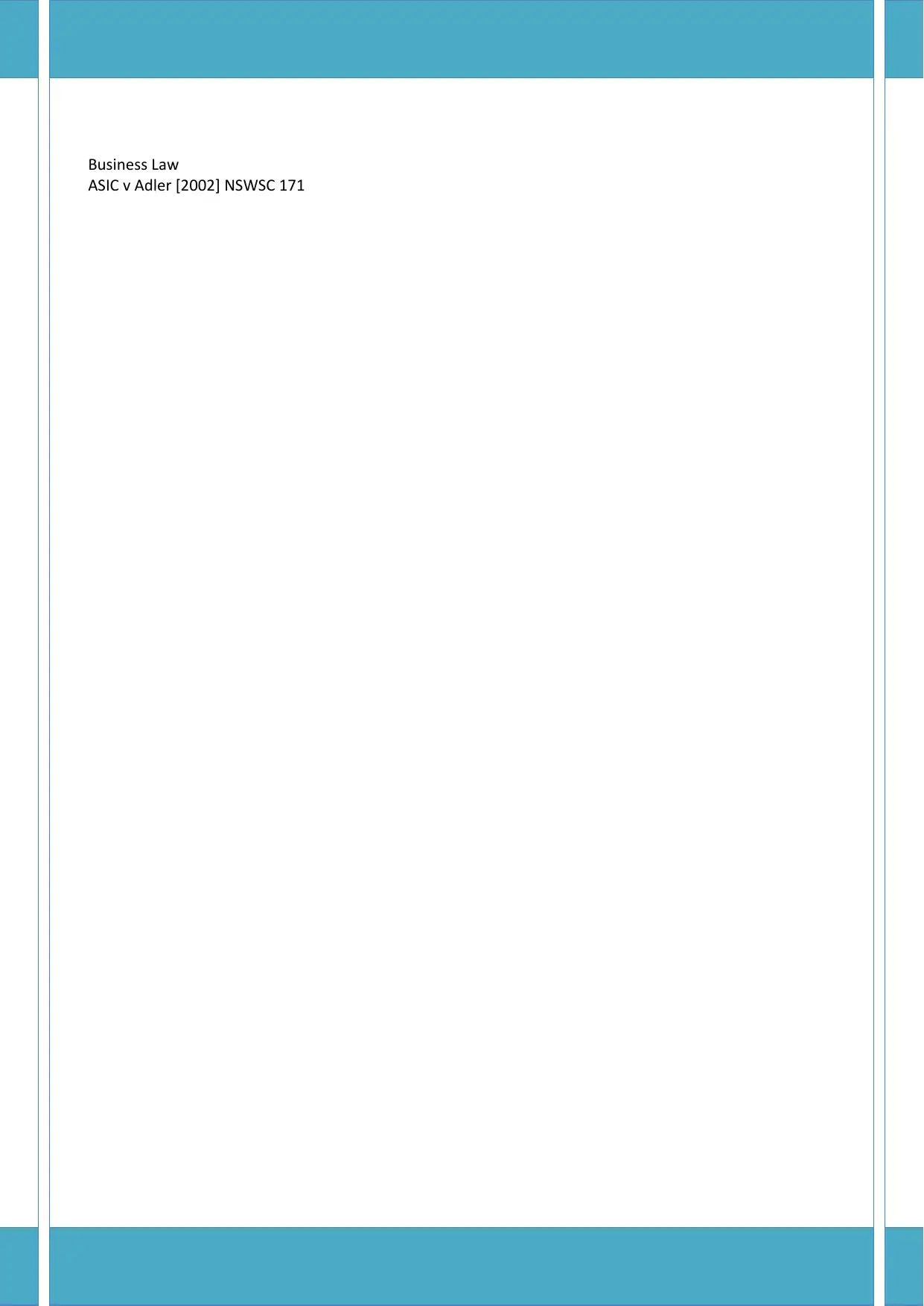
Business Law
ASIC v Adler [2002] NSWSC 171
ASIC v Adler [2002] NSWSC 171
Paraphrase This Document
Need a fresh take? Get an instant paraphrase of this document with our AI Paraphraser
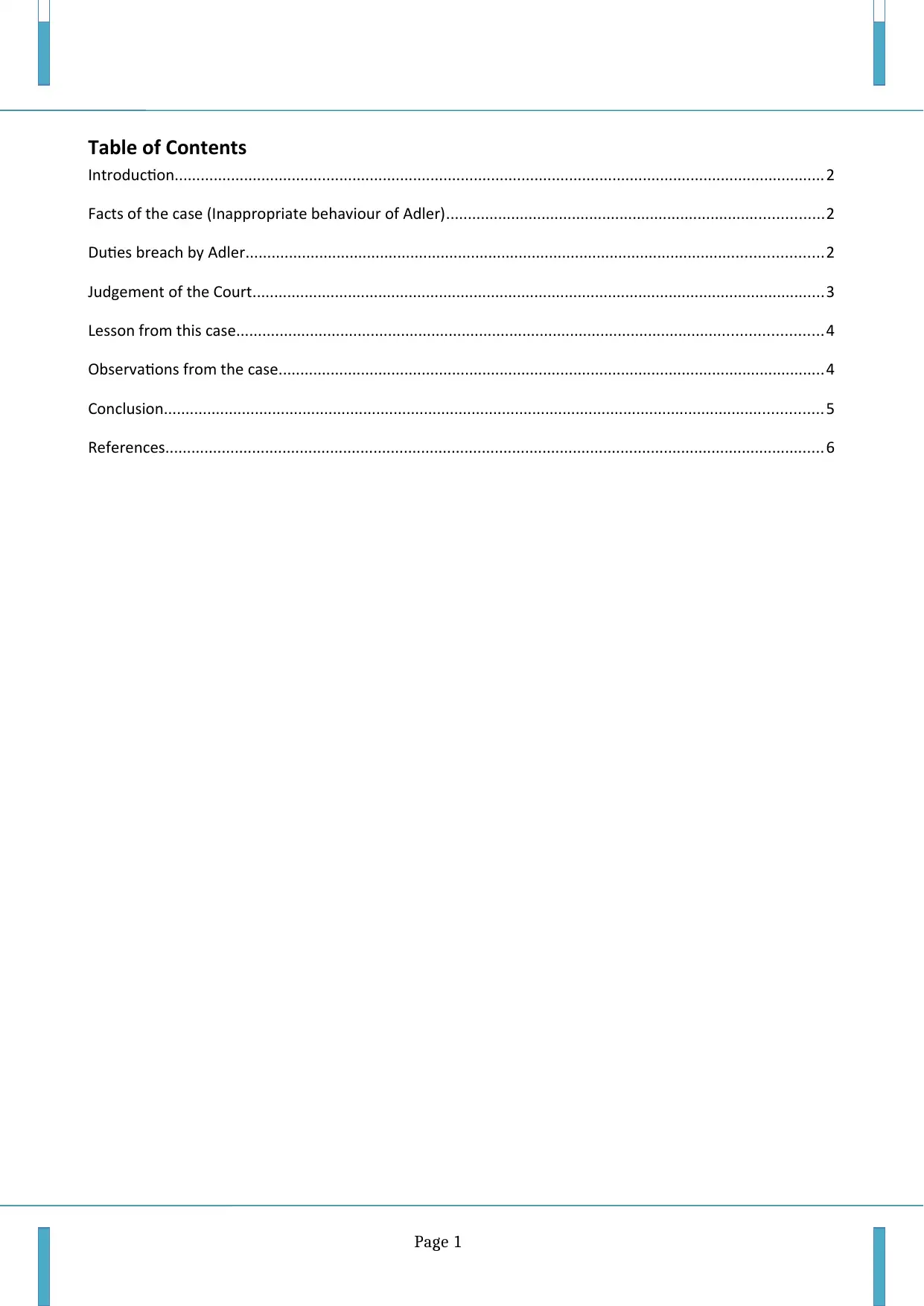
Table of Contents
Introduction......................................................................................................................................................2
Facts of the case (Inappropriate behaviour of Adler).......................................................................................2
Duties breach by Adler.....................................................................................................................................2
Judgement of the Court....................................................................................................................................3
Lesson from this case.......................................................................................................................................4
Observations from the case..............................................................................................................................4
Conclusion........................................................................................................................................................5
References........................................................................................................................................................6
Page 1
Introduction......................................................................................................................................................2
Facts of the case (Inappropriate behaviour of Adler).......................................................................................2
Duties breach by Adler.....................................................................................................................................2
Judgement of the Court....................................................................................................................................3
Lesson from this case.......................................................................................................................................4
Observations from the case..............................................................................................................................4
Conclusion........................................................................................................................................................5
References........................................................................................................................................................6
Page 1
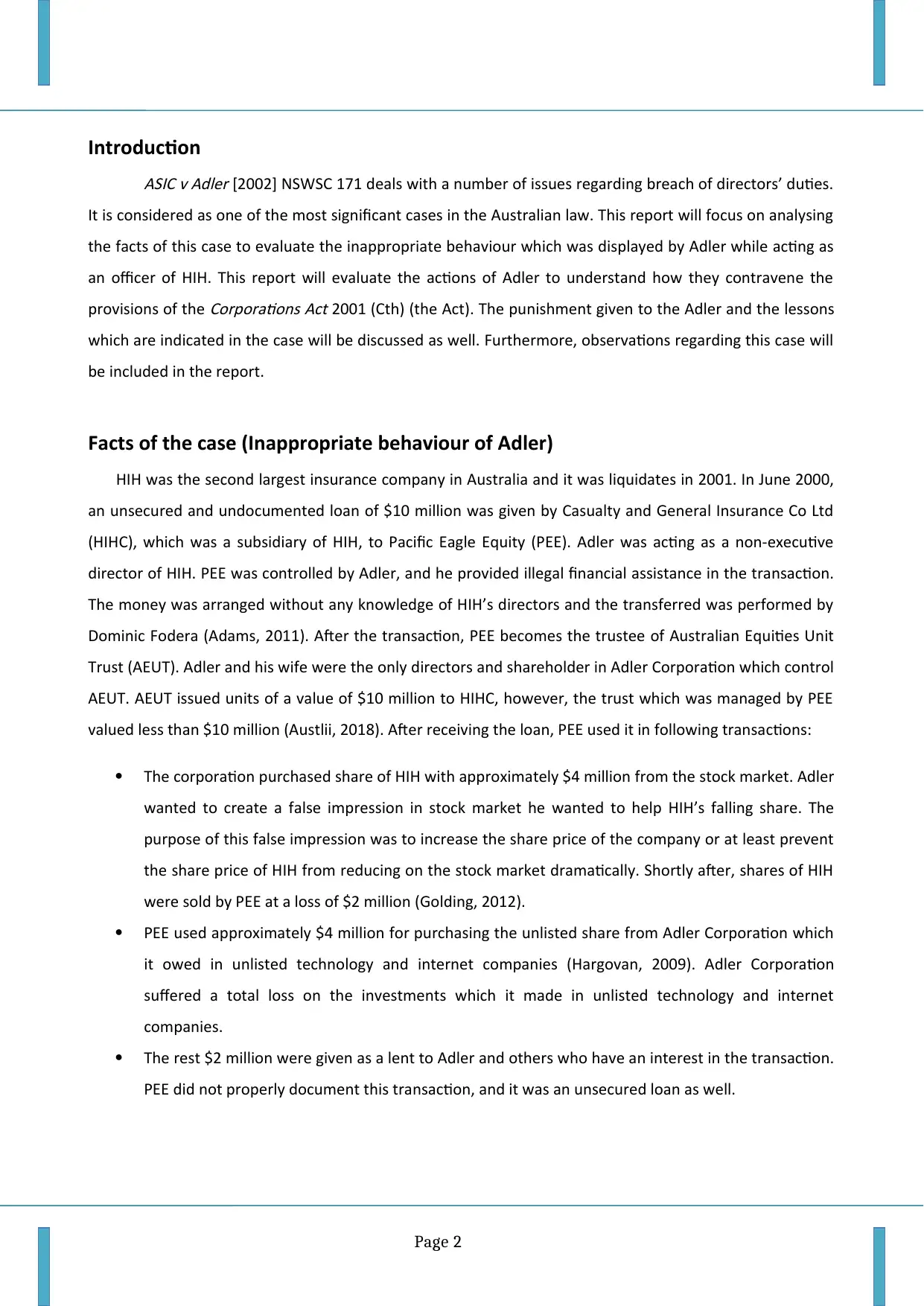
IntroductionASIC v Adler [2002] NSWSC 171 deals with a number of issues regarding breach of directors’ duties.
It is considered as one of the most significant cases in the Australian law. This report will focus on analysing
the facts of this case to evaluate the inappropriate behaviour which was displayed by Adler while acting as
an officer of HIH. This report will evaluate the actions of Adler to understand how they contravene the
provisions of the
Corporations Act 2001 (Cth) (the Act). The punishment given to the Adler and the lessons
which are indicated in the case will be discussed as well. Furthermore, observations regarding this case will
be included in the report.
Facts of the case (Inappropriate behaviour of Adler)
HIH was the second largest insurance company in Australia and it was liquidates in 2001. In June 2000,
an unsecured and undocumented loan of $10 million was given by Casualty and General Insurance Co Ltd
(HIHC), which was a subsidiary of HIH, to Pacific Eagle Equity (PEE). Adler was acting as a non-executive
director of HIH. PEE was controlled by Adler, and he provided illegal financial assistance in the transaction.
The money was arranged without any knowledge of HIH’s directors and the transferred was performed by
Dominic Fodera (Adams, 2011). After the transaction, PEE becomes the trustee of Australian Equities Unit
Trust (AEUT). Adler and his wife were the only directors and shareholder in Adler Corporation which control
AEUT. AEUT issued units of a value of $10 million to HIHC, however, the trust which was managed by PEE
valued less than $10 million (Austlii, 2018). After receiving the loan, PEE used it in following transactions:
The corporation purchased share of HIH with approximately $4 million from the stock market. Adler
wanted to create a false impression in stock market he wanted to help HIH’s falling share. The
purpose of this false impression was to increase the share price of the company or at least prevent
the share price of HIH from reducing on the stock market dramatically. Shortly after, shares of HIH
were sold by PEE at a loss of $2 million (Golding, 2012).
PEE used approximately $4 million for purchasing the unlisted share from Adler Corporation which
it owed in unlisted technology and internet companies (Hargovan, 2009). Adler Corporation
suffered a total loss on the investments which it made in unlisted technology and internet
companies.
The rest $2 million were given as a lent to Adler and others who have an interest in the transaction.
PEE did not properly document this transaction, and it was an unsecured loan as well.
Page 2
It is considered as one of the most significant cases in the Australian law. This report will focus on analysing
the facts of this case to evaluate the inappropriate behaviour which was displayed by Adler while acting as
an officer of HIH. This report will evaluate the actions of Adler to understand how they contravene the
provisions of the
Corporations Act 2001 (Cth) (the Act). The punishment given to the Adler and the lessons
which are indicated in the case will be discussed as well. Furthermore, observations regarding this case will
be included in the report.
Facts of the case (Inappropriate behaviour of Adler)
HIH was the second largest insurance company in Australia and it was liquidates in 2001. In June 2000,
an unsecured and undocumented loan of $10 million was given by Casualty and General Insurance Co Ltd
(HIHC), which was a subsidiary of HIH, to Pacific Eagle Equity (PEE). Adler was acting as a non-executive
director of HIH. PEE was controlled by Adler, and he provided illegal financial assistance in the transaction.
The money was arranged without any knowledge of HIH’s directors and the transferred was performed by
Dominic Fodera (Adams, 2011). After the transaction, PEE becomes the trustee of Australian Equities Unit
Trust (AEUT). Adler and his wife were the only directors and shareholder in Adler Corporation which control
AEUT. AEUT issued units of a value of $10 million to HIHC, however, the trust which was managed by PEE
valued less than $10 million (Austlii, 2018). After receiving the loan, PEE used it in following transactions:
The corporation purchased share of HIH with approximately $4 million from the stock market. Adler
wanted to create a false impression in stock market he wanted to help HIH’s falling share. The
purpose of this false impression was to increase the share price of the company or at least prevent
the share price of HIH from reducing on the stock market dramatically. Shortly after, shares of HIH
were sold by PEE at a loss of $2 million (Golding, 2012).
PEE used approximately $4 million for purchasing the unlisted share from Adler Corporation which
it owed in unlisted technology and internet companies (Hargovan, 2009). Adler Corporation
suffered a total loss on the investments which it made in unlisted technology and internet
companies.
The rest $2 million were given as a lent to Adler and others who have an interest in the transaction.
PEE did not properly document this transaction, and it was an unsecured loan as well.
Page 2
⊘ This is a preview!⊘
Do you want full access?
Subscribe today to unlock all pages.

Trusted by 1+ million students worldwide
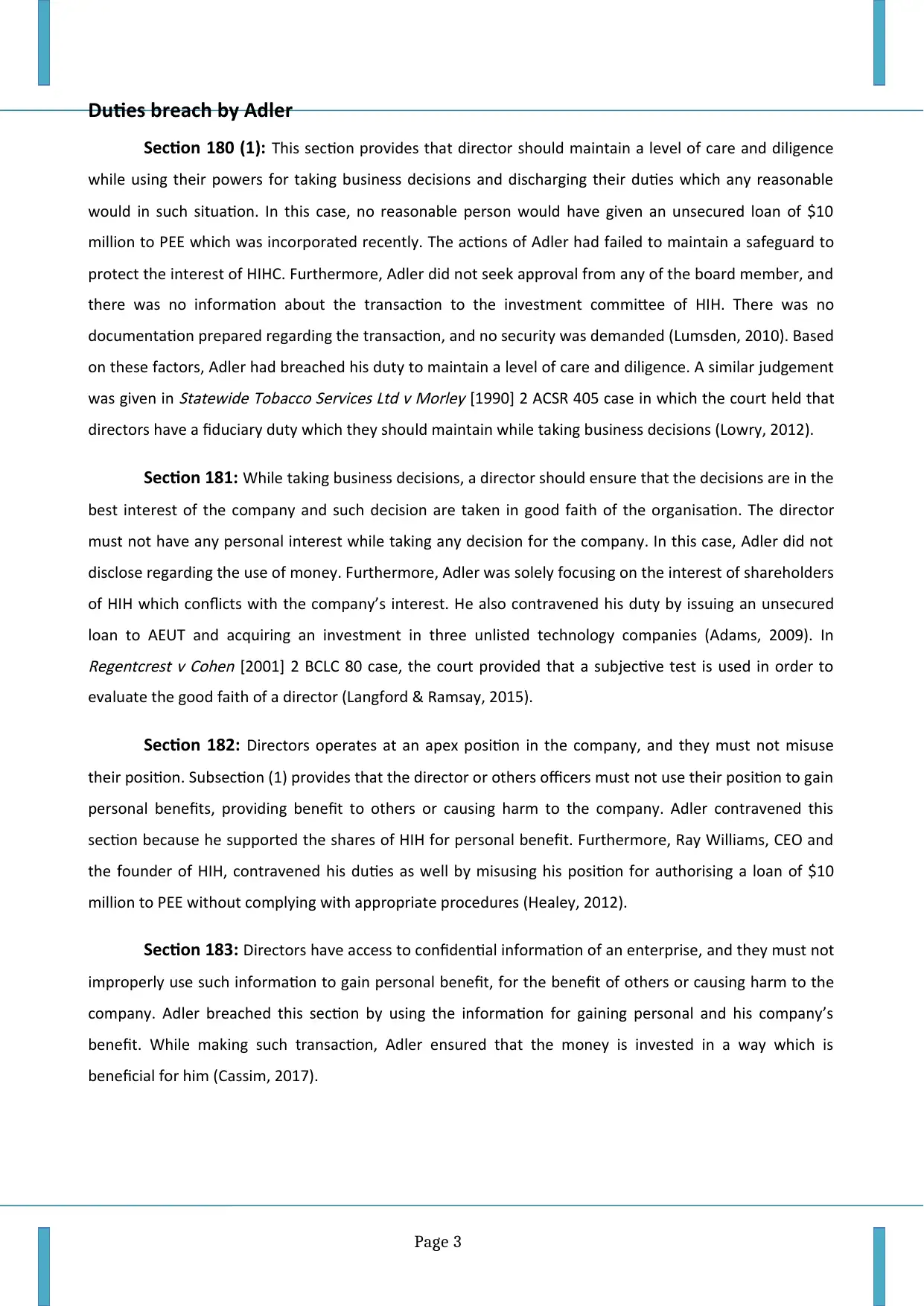
Duties breach by Adler
Section 180 (1): This section provides that director should maintain a level of care and diligence
while using their powers for taking business decisions and discharging their duties which any reasonable
would in such situation. In this case, no reasonable person would have given an unsecured loan of $10
million to PEE which was incorporated recently. The actions of Adler had failed to maintain a safeguard to
protect the interest of HIHC. Furthermore, Adler did not seek approval from any of the board member, and
there was no information about the transaction to the investment committee of HIH. There was no
documentation prepared regarding the transaction, and no security was demanded (Lumsden, 2010). Based
on these factors, Adler had breached his duty to maintain a level of care and diligence. A similar judgement
was given in
Statewide Tobacco Services Ltd v Morley [1990] 2 ACSR 405 case in which the court held that
directors have a fiduciary duty which they should maintain while taking business decisions (Lowry, 2012).
Section 181: While taking business decisions, a director should ensure that the decisions are in the
best interest of the company and such decision are taken in good faith of the organisation. The director
must not have any personal interest while taking any decision for the company. In this case, Adler did not
disclose regarding the use of money. Furthermore, Adler was solely focusing on the interest of shareholders
of HIH which conflicts with the company’s interest. He also contravened his duty by issuing an unsecured
loan to AEUT and acquiring an investment in three unlisted technology companies (Adams, 2009). InRegentcrest v Cohen [2001] 2 BCLC 80 case, the court provided that a subjective test is used in order to
evaluate the good faith of a director (Langford & Ramsay, 2015).
Section 182: Directors operates at an apex position in the company, and they must not misuse
their position. Subsection (1) provides that the director or others officers must not use their position to gain
personal benefits, providing benefit to others or causing harm to the company. Adler contravened this
section because he supported the shares of HIH for personal benefit. Furthermore, Ray Williams, CEO and
the founder of HIH, contravened his duties as well by misusing his position for authorising a loan of $10
million to PEE without complying with appropriate procedures (Healey, 2012).
Section 183: Directors have access to confidential information of an enterprise, and they must not
improperly use such information to gain personal benefit, for the benefit of others or causing harm to the
company. Adler breached this section by using the information for gaining personal and his company’s
benefit. While making such transaction, Adler ensured that the money is invested in a way which is
beneficial for him (Cassim, 2017).
Page 3
Section 180 (1): This section provides that director should maintain a level of care and diligence
while using their powers for taking business decisions and discharging their duties which any reasonable
would in such situation. In this case, no reasonable person would have given an unsecured loan of $10
million to PEE which was incorporated recently. The actions of Adler had failed to maintain a safeguard to
protect the interest of HIHC. Furthermore, Adler did not seek approval from any of the board member, and
there was no information about the transaction to the investment committee of HIH. There was no
documentation prepared regarding the transaction, and no security was demanded (Lumsden, 2010). Based
on these factors, Adler had breached his duty to maintain a level of care and diligence. A similar judgement
was given in
Statewide Tobacco Services Ltd v Morley [1990] 2 ACSR 405 case in which the court held that
directors have a fiduciary duty which they should maintain while taking business decisions (Lowry, 2012).
Section 181: While taking business decisions, a director should ensure that the decisions are in the
best interest of the company and such decision are taken in good faith of the organisation. The director
must not have any personal interest while taking any decision for the company. In this case, Adler did not
disclose regarding the use of money. Furthermore, Adler was solely focusing on the interest of shareholders
of HIH which conflicts with the company’s interest. He also contravened his duty by issuing an unsecured
loan to AEUT and acquiring an investment in three unlisted technology companies (Adams, 2009). InRegentcrest v Cohen [2001] 2 BCLC 80 case, the court provided that a subjective test is used in order to
evaluate the good faith of a director (Langford & Ramsay, 2015).
Section 182: Directors operates at an apex position in the company, and they must not misuse
their position. Subsection (1) provides that the director or others officers must not use their position to gain
personal benefits, providing benefit to others or causing harm to the company. Adler contravened this
section because he supported the shares of HIH for personal benefit. Furthermore, Ray Williams, CEO and
the founder of HIH, contravened his duties as well by misusing his position for authorising a loan of $10
million to PEE without complying with appropriate procedures (Healey, 2012).
Section 183: Directors have access to confidential information of an enterprise, and they must not
improperly use such information to gain personal benefit, for the benefit of others or causing harm to the
company. Adler breached this section by using the information for gaining personal and his company’s
benefit. While making such transaction, Adler ensured that the money is invested in a way which is
beneficial for him (Cassim, 2017).
Page 3
Paraphrase This Document
Need a fresh take? Get an instant paraphrase of this document with our AI Paraphraser
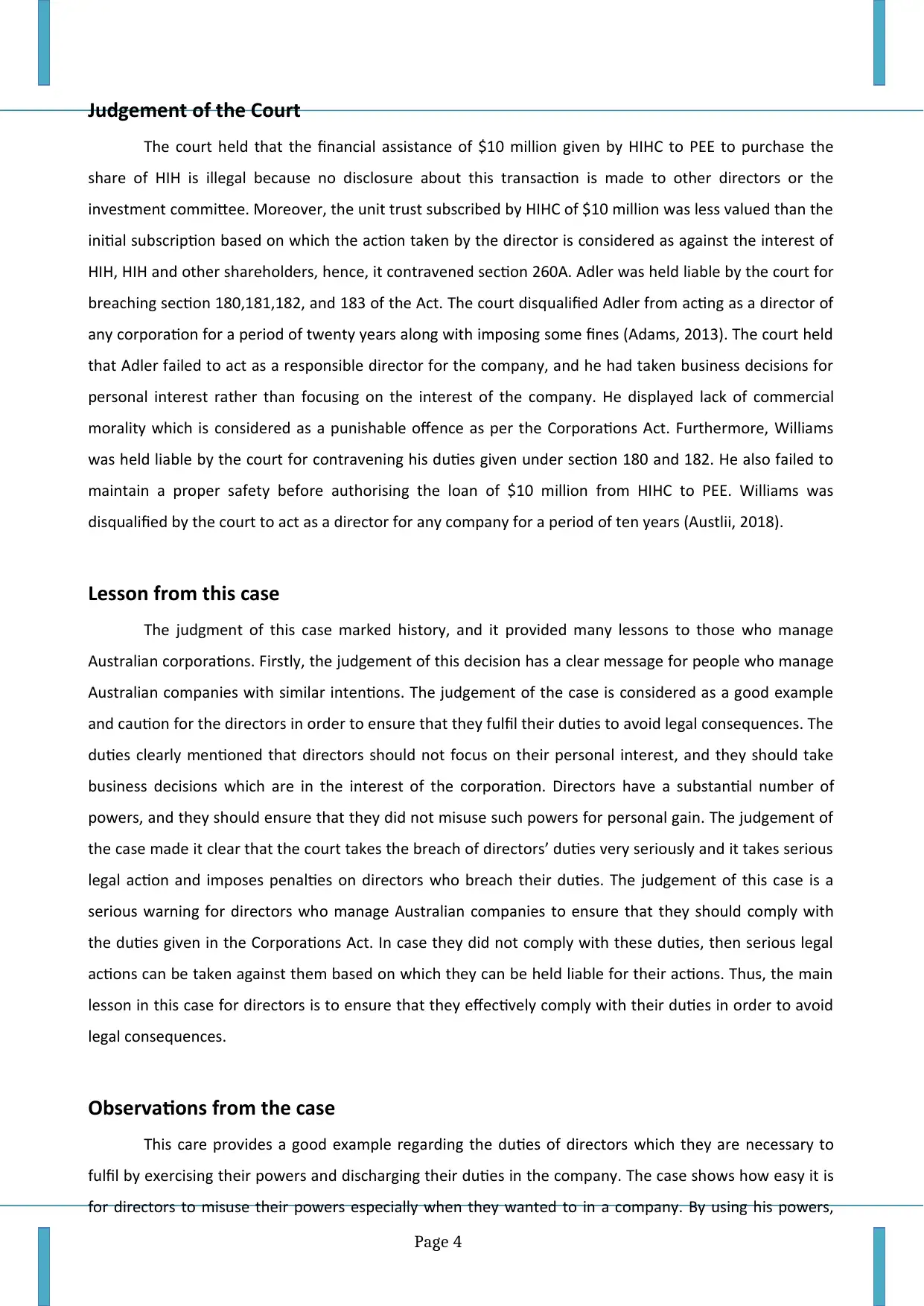
Judgement of the Court
The court held that the financial assistance of $10 million given by HIHC to PEE to purchase the
share of HIH is illegal because no disclosure about this transaction is made to other directors or the
investment committee. Moreover, the unit trust subscribed by HIHC of $10 million was less valued than the
initial subscription based on which the action taken by the director is considered as against the interest of
HIH, HIH and other shareholders, hence, it contravened section 260A. Adler was held liable by the court for
breaching section 180,181,182, and 183 of the Act. The court disqualified Adler from acting as a director of
any corporation for a period of twenty years along with imposing some fines (Adams, 2013). The court held
that Adler failed to act as a responsible director for the company, and he had taken business decisions for
personal interest rather than focusing on the interest of the company. He displayed lack of commercial
morality which is considered as a punishable offence as per the Corporations Act. Furthermore, Williams
was held liable by the court for contravening his duties given under section 180 and 182. He also failed to
maintain a proper safety before authorising the loan of $10 million from HIHC to PEE. Williams was
disqualified by the court to act as a director for any company for a period of ten years (Austlii, 2018).
Lesson from this case
The judgment of this case marked history, and it provided many lessons to those who manage
Australian corporations. Firstly, the judgement of this decision has a clear message for people who manage
Australian companies with similar intentions. The judgement of the case is considered as a good example
and caution for the directors in order to ensure that they fulfil their duties to avoid legal consequences. The
duties clearly mentioned that directors should not focus on their personal interest, and they should take
business decisions which are in the interest of the corporation. Directors have a substantial number of
powers, and they should ensure that they did not misuse such powers for personal gain. The judgement of
the case made it clear that the court takes the breach of directors’ duties very seriously and it takes serious
legal action and imposes penalties on directors who breach their duties. The judgement of this case is a
serious warning for directors who manage Australian companies to ensure that they should comply with
the duties given in the Corporations Act. In case they did not comply with these duties, then serious legal
actions can be taken against them based on which they can be held liable for their actions. Thus, the main
lesson in this case for directors is to ensure that they effectively comply with their duties in order to avoid
legal consequences.
Observations from the case
This care provides a good example regarding the duties of directors which they are necessary to
fulfil by exercising their powers and discharging their duties in the company. The case shows how easy it is
for directors to misuse their powers especially when they wanted to in a company. By using his powers,
Page 4
The court held that the financial assistance of $10 million given by HIHC to PEE to purchase the
share of HIH is illegal because no disclosure about this transaction is made to other directors or the
investment committee. Moreover, the unit trust subscribed by HIHC of $10 million was less valued than the
initial subscription based on which the action taken by the director is considered as against the interest of
HIH, HIH and other shareholders, hence, it contravened section 260A. Adler was held liable by the court for
breaching section 180,181,182, and 183 of the Act. The court disqualified Adler from acting as a director of
any corporation for a period of twenty years along with imposing some fines (Adams, 2013). The court held
that Adler failed to act as a responsible director for the company, and he had taken business decisions for
personal interest rather than focusing on the interest of the company. He displayed lack of commercial
morality which is considered as a punishable offence as per the Corporations Act. Furthermore, Williams
was held liable by the court for contravening his duties given under section 180 and 182. He also failed to
maintain a proper safety before authorising the loan of $10 million from HIHC to PEE. Williams was
disqualified by the court to act as a director for any company for a period of ten years (Austlii, 2018).
Lesson from this case
The judgment of this case marked history, and it provided many lessons to those who manage
Australian corporations. Firstly, the judgement of this decision has a clear message for people who manage
Australian companies with similar intentions. The judgement of the case is considered as a good example
and caution for the directors in order to ensure that they fulfil their duties to avoid legal consequences. The
duties clearly mentioned that directors should not focus on their personal interest, and they should take
business decisions which are in the interest of the corporation. Directors have a substantial number of
powers, and they should ensure that they did not misuse such powers for personal gain. The judgement of
the case made it clear that the court takes the breach of directors’ duties very seriously and it takes serious
legal action and imposes penalties on directors who breach their duties. The judgement of this case is a
serious warning for directors who manage Australian companies to ensure that they should comply with
the duties given in the Corporations Act. In case they did not comply with these duties, then serious legal
actions can be taken against them based on which they can be held liable for their actions. Thus, the main
lesson in this case for directors is to ensure that they effectively comply with their duties in order to avoid
legal consequences.
Observations from the case
This care provides a good example regarding the duties of directors which they are necessary to
fulfil by exercising their powers and discharging their duties in the company. The case shows how easy it is
for directors to misuse their powers especially when they wanted to in a company. By using his powers,
Page 4
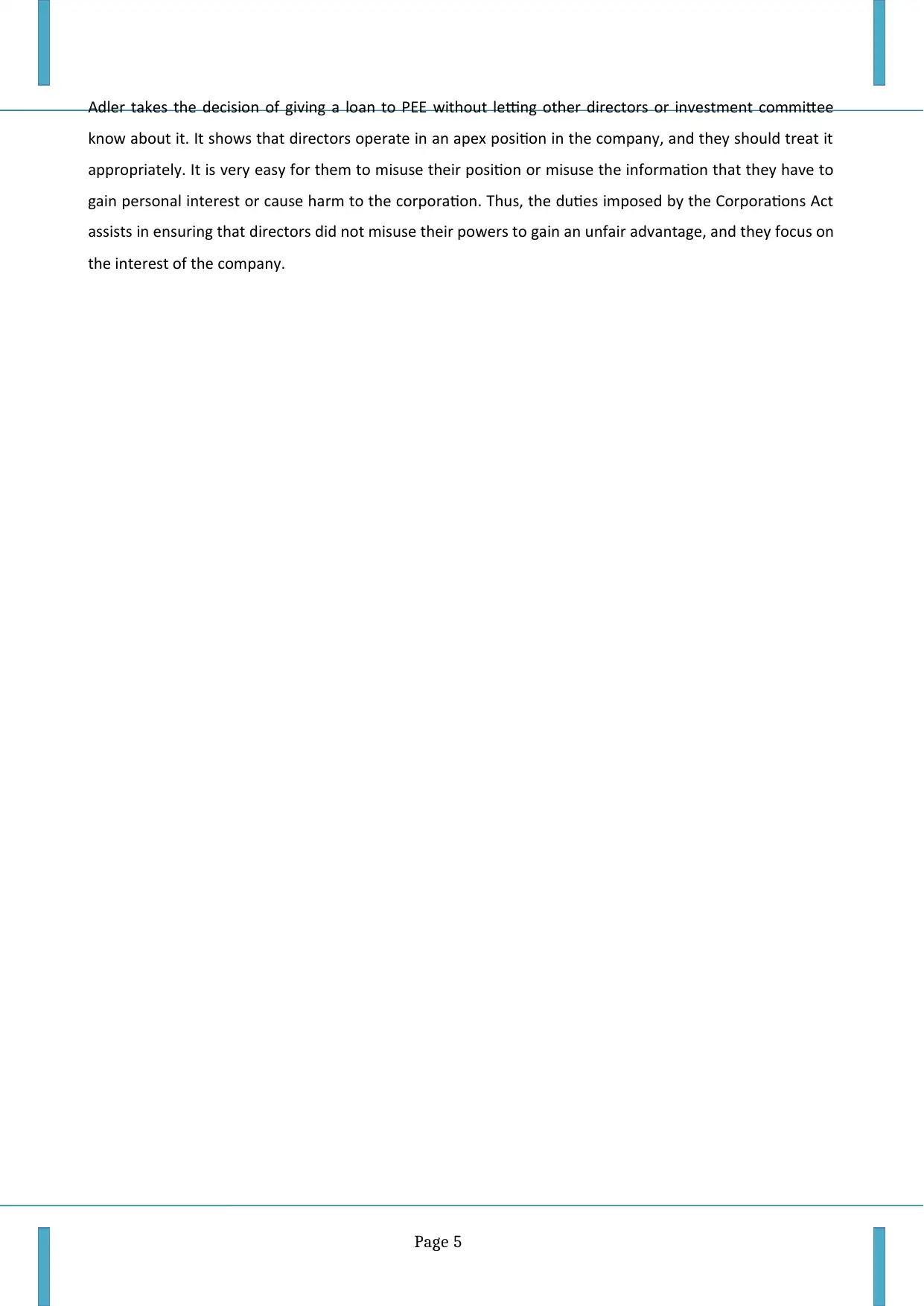
Adler takes the decision of giving a loan to PEE without letting other directors or investment committee
know about it. It shows that directors operate in an apex position in the company, and they should treat it
appropriately. It is very easy for them to misuse their position or misuse the information that they have to
gain personal interest or cause harm to the corporation. Thus, the duties imposed by the Corporations Act
assists in ensuring that directors did not misuse their powers to gain an unfair advantage, and they focus on
the interest of the company.
Page 5
know about it. It shows that directors operate in an apex position in the company, and they should treat it
appropriately. It is very easy for them to misuse their position or misuse the information that they have to
gain personal interest or cause harm to the corporation. Thus, the duties imposed by the Corporations Act
assists in ensuring that directors did not misuse their powers to gain an unfair advantage, and they focus on
the interest of the company.
Page 5
⊘ This is a preview!⊘
Do you want full access?
Subscribe today to unlock all pages.

Trusted by 1+ million students worldwide
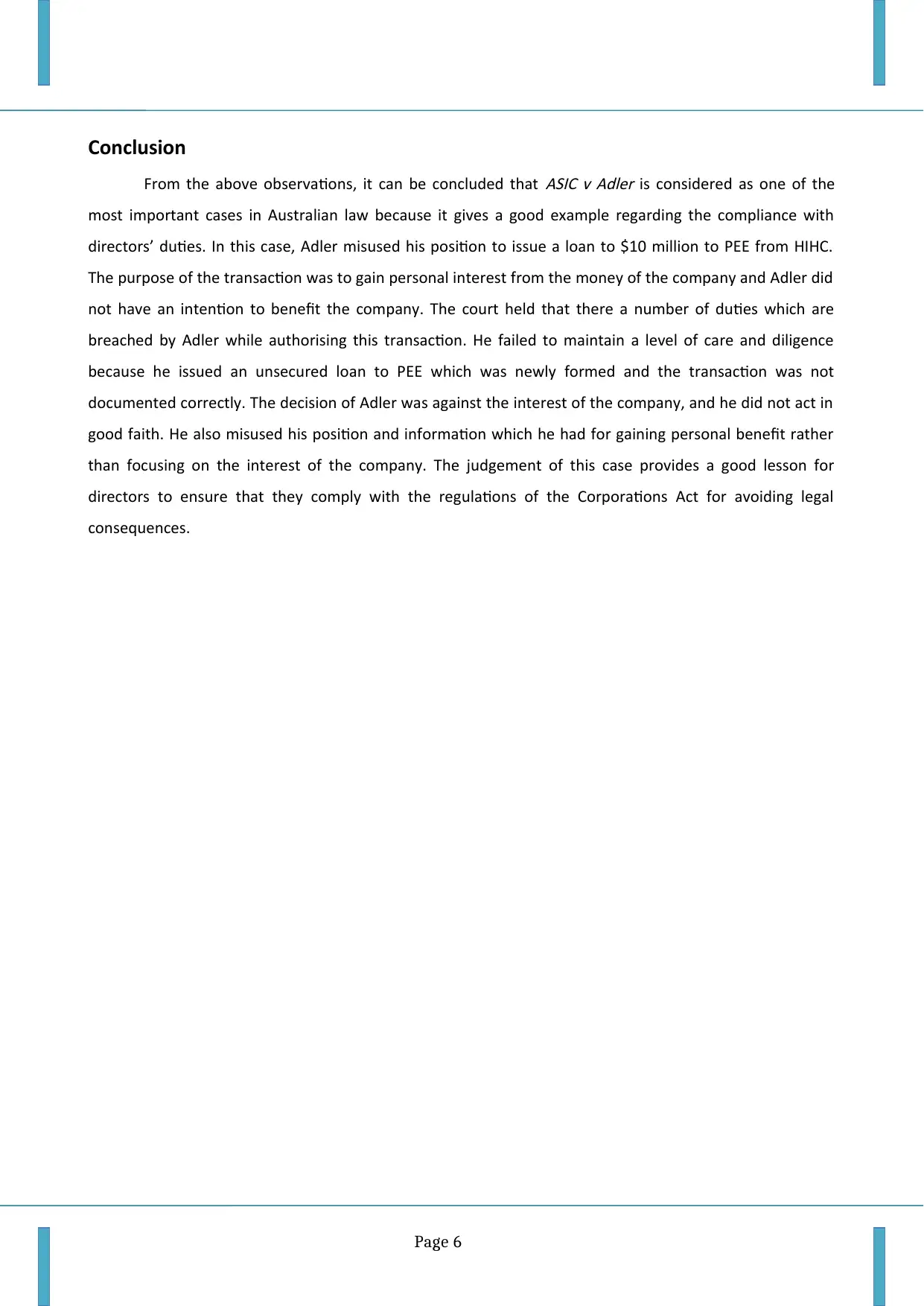
Conclusion
From the above observations, it can be concluded that
ASIC v Adler is considered as one of the
most important cases in Australian law because it gives a good example regarding the compliance with
directors’ duties. In this case, Adler misused his position to issue a loan to $10 million to PEE from HIHC.
The purpose of the transaction was to gain personal interest from the money of the company and Adler did
not have an intention to benefit the company. The court held that there a number of duties which are
breached by Adler while authorising this transaction. He failed to maintain a level of care and diligence
because he issued an unsecured loan to PEE which was newly formed and the transaction was not
documented correctly. The decision of Adler was against the interest of the company, and he did not act in
good faith. He also misused his position and information which he had for gaining personal benefit rather
than focusing on the interest of the company. The judgement of this case provides a good lesson for
directors to ensure that they comply with the regulations of the Corporations Act for avoiding legal
consequences.
Page 6
From the above observations, it can be concluded that
ASIC v Adler is considered as one of the
most important cases in Australian law because it gives a good example regarding the compliance with
directors’ duties. In this case, Adler misused his position to issue a loan to $10 million to PEE from HIHC.
The purpose of the transaction was to gain personal interest from the money of the company and Adler did
not have an intention to benefit the company. The court held that there a number of duties which are
breached by Adler while authorising this transaction. He failed to maintain a level of care and diligence
because he issued an unsecured loan to PEE which was newly formed and the transaction was not
documented correctly. The decision of Adler was against the interest of the company, and he did not act in
good faith. He also misused his position and information which he had for gaining personal benefit rather
than focusing on the interest of the company. The judgement of this case provides a good lesson for
directors to ensure that they comply with the regulations of the Corporations Act for avoiding legal
consequences.
Page 6
Paraphrase This Document
Need a fresh take? Get an instant paraphrase of this document with our AI Paraphraser
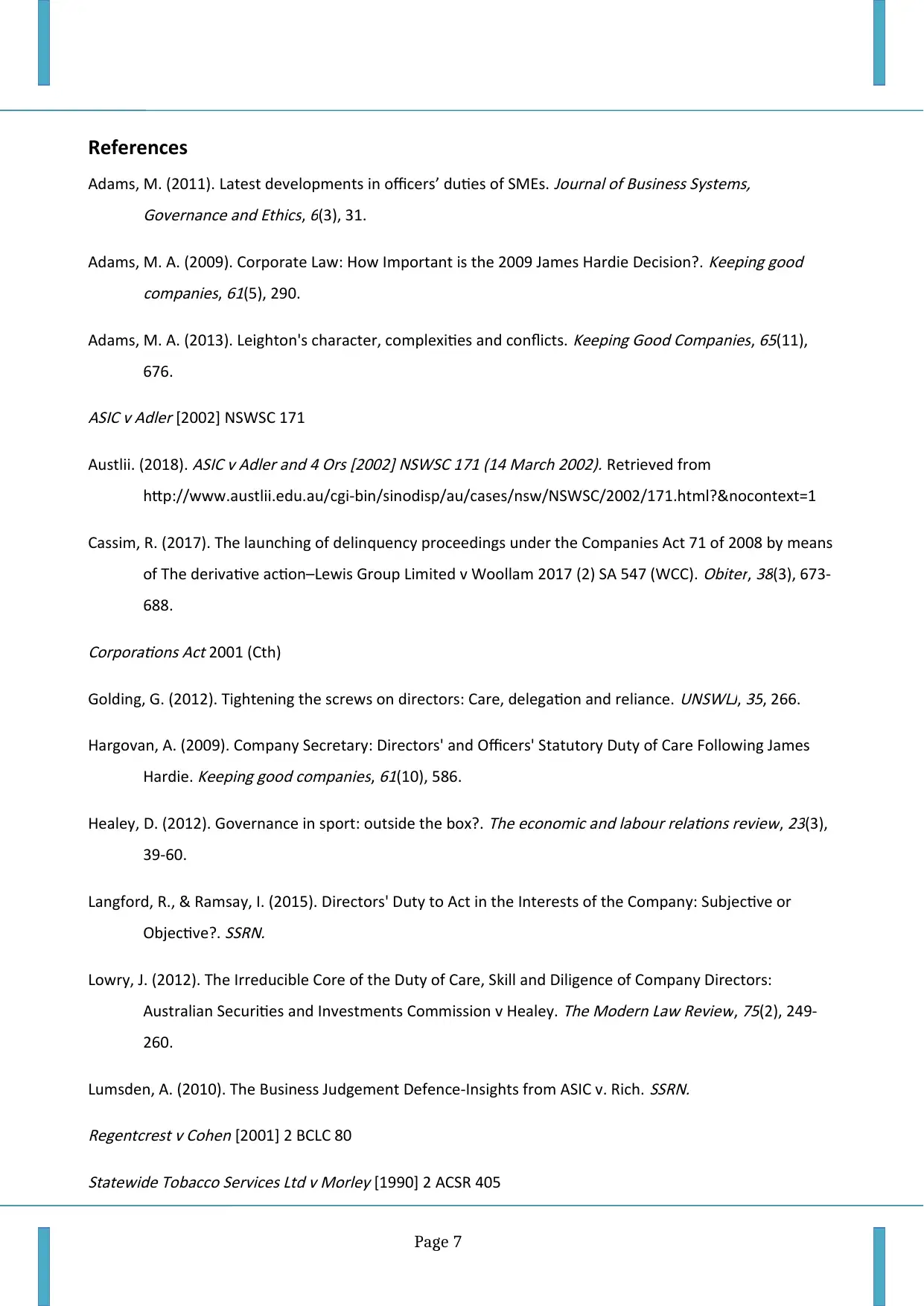
References
Adams, M. (2011). Latest developments in officers’ duties of SMEs.
Journal of Business Systems,
Governance and Ethics,
6(3), 31.
Adams, M. A. (2009). Corporate Law: How Important is the 2009 James Hardie Decision?.
Keeping good
companies,
61(5), 290.
Adams, M. A. (2013). Leighton's character, complexities and conflicts.
Keeping Good Companies,
65(11),
676.
ASIC v Adler [2002] NSWSC 171
Austlii. (2018).
ASIC v Adler and 4 Ors [2002] NSWSC 171 (14 March 2002). Retrieved from
http://www.austlii.edu.au/cgi-bin/sinodisp/au/cases/nsw/NSWSC/2002/171.html?&nocontext=1
Cassim, R. (2017). The launching of delinquency proceedings under the Companies Act 71 of 2008 by means
of The derivative action–Lewis Group Limited v Woollam 2017 (2) SA 547 (WCC).
Obiter,
38(3), 673-
688.
Corporations Act 2001 (Cth)
Golding, G. (2012). Tightening the screws on directors: Care, delegation and reliance.
UNSWLJ,
35, 266.
Hargovan, A. (2009). Company Secretary: Directors' and Officers' Statutory Duty of Care Following James
Hardie.
Keeping good companies,
61(10), 586.
Healey, D. (2012). Governance in sport: outside the box?.
The economic and labour relations review,
23(3),
39-60.
Langford, R., & Ramsay, I. (2015). Directors' Duty to Act in the Interests of the Company: Subjective or
Objective?.
SSRN.
Lowry, J. (2012). The Irreducible Core of the Duty of Care, Skill and Diligence of Company Directors:
Australian Securities and Investments Commission v Healey.
The Modern Law Review,
75(2), 249-
260.
Lumsden, A. (2010). The Business Judgement Defence-Insights from ASIC v. Rich.
SSRN.
Regentcrest v Cohen [2001] 2 BCLC 80
Statewide Tobacco Services Ltd v Morley [1990] 2 ACSR 405
Page 7
Adams, M. (2011). Latest developments in officers’ duties of SMEs.
Journal of Business Systems,
Governance and Ethics,
6(3), 31.
Adams, M. A. (2009). Corporate Law: How Important is the 2009 James Hardie Decision?.
Keeping good
companies,
61(5), 290.
Adams, M. A. (2013). Leighton's character, complexities and conflicts.
Keeping Good Companies,
65(11),
676.
ASIC v Adler [2002] NSWSC 171
Austlii. (2018).
ASIC v Adler and 4 Ors [2002] NSWSC 171 (14 March 2002). Retrieved from
http://www.austlii.edu.au/cgi-bin/sinodisp/au/cases/nsw/NSWSC/2002/171.html?&nocontext=1
Cassim, R. (2017). The launching of delinquency proceedings under the Companies Act 71 of 2008 by means
of The derivative action–Lewis Group Limited v Woollam 2017 (2) SA 547 (WCC).
Obiter,
38(3), 673-
688.
Corporations Act 2001 (Cth)
Golding, G. (2012). Tightening the screws on directors: Care, delegation and reliance.
UNSWLJ,
35, 266.
Hargovan, A. (2009). Company Secretary: Directors' and Officers' Statutory Duty of Care Following James
Hardie.
Keeping good companies,
61(10), 586.
Healey, D. (2012). Governance in sport: outside the box?.
The economic and labour relations review,
23(3),
39-60.
Langford, R., & Ramsay, I. (2015). Directors' Duty to Act in the Interests of the Company: Subjective or
Objective?.
SSRN.
Lowry, J. (2012). The Irreducible Core of the Duty of Care, Skill and Diligence of Company Directors:
Australian Securities and Investments Commission v Healey.
The Modern Law Review,
75(2), 249-
260.
Lumsden, A. (2010). The Business Judgement Defence-Insights from ASIC v. Rich.
SSRN.
Regentcrest v Cohen [2001] 2 BCLC 80
Statewide Tobacco Services Ltd v Morley [1990] 2 ACSR 405
Page 7

Page 8
⊘ This is a preview!⊘
Do you want full access?
Subscribe today to unlock all pages.

Trusted by 1+ million students worldwide
1 out of 9
Related Documents
Your All-in-One AI-Powered Toolkit for Academic Success.
+13062052269
info@desklib.com
Available 24*7 on WhatsApp / Email
![[object Object]](/_next/static/media/star-bottom.7253800d.svg)
Unlock your academic potential
Copyright © 2020–2026 A2Z Services. All Rights Reserved. Developed and managed by ZUCOL.




